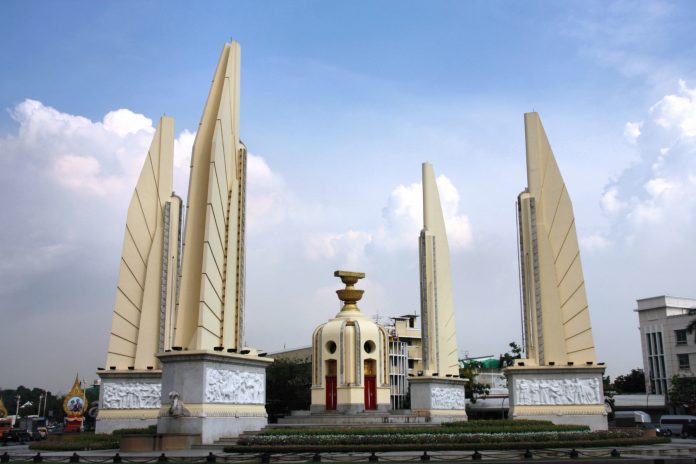Parliamentarians from across Southeast Asia have expressed deep concerns about Thailand’s new draft constitution, as well as a planned referendum on the charter, highlighting an apparent effort by the military government to strengthen and prolong its control over Thai politics and stifle open debate
JAKARTA — Parliamentarians from across Southeast Asia have expressed deep concerns about Thailand’s new draft constitution, as well as a planned referendum on the charter, highlighting an apparent effort by the military government to strengthen and prolong its control over Thai politics and stifle open debate.
ASEAN Parliamentarians for Human Rights (APHR) criticized the decision by the ruling National Council for Peace and Order (NCPO) to outlaw campaigns for or against the charter in advance of the referendum, slated for 7 August, and called on Thailand’s leaders to allow for a robust, public discussion of the draft.
“The Thai people are being asked to vote on the core laws that will determine how they are governed, and they aren’t even allowed to speak about them publicly, under threat of imprisonment. How can they be expected to make an informed decision under this arrangement?” said APHR Chairperson Charles Santiago, a member of the Malaysian Parliament.
“If the junta truly believes—as it insists—that this is a matter for the people to decide, then it should allow the people to speak directly to one another about the draft’s merits and drawbacks. Without allowing for such open debate, the Thai junta is effectively attempting to force-feed this constitution to the population.”
The law governing the rules for the referendum, which was approved by the current military-appointed legislature on 7 April, mandates up to 10 years’ imprisonment for anyone convicted of disseminating false information to influence voters or otherwise disrupt the referendum. Junta leaders have also failed to clarify their plan if voters reject the constitution, with some insinuating that a failure to approve the current draft could prolong military rule further.
“People shouldn’t be thrown in jail for simply expressing their opinions. We have already seen individuals who have made comments on the charter subjected to arbitrary detention and so-called ‘re-education,’ and the referendum rules seem designed to stoke fear among the people and stifle debate further,” said APHR Vice Chair Son Chhay, a member of the Cambodian National Assembly.
“The fate of democracy in Thailand has implications for the entire region. It is critical that leaders from around Southeast Asia stand with the Thai people and speak out in support of free expression and informed debate. This draft constitution must be judged on its merits through open discussion. Attempting to gag and intimidate critics is no way to run a country and certainly no way to resolve the political polarization and strife that has characterized Thai politics in recent years,” Son Chhay added.
The draft constitution, which was released publicly on 29 March, includes clauses mandating a fully appointed Senate and enabling the appointment of an unelected prime minister. The charter gives the military broad control over administrative affairs even after an elected government is installed. In addition, clauses of the charter enable the permanent legalization of orders issued unilaterally by NCPO leader Prayuth Chan-ocha under Article 44 of the junta-drafted interim constitution.
Civil society and political parties in Thailand have criticized the draft, highlighting its undemocratic provisions, including the special place reserved for military appointees. These critiques were echoed by regional MPs.
“The fact that the constitution preserves an explicit role for the military indefinitely is particularly concerning,” said APHR Vice Chair Eva Kusuma Sundari, a member of the House of Representatives in Indonesia.
“We have seen the result of a similar setup in Myanmar, where the military controls 25 percent of seats and is able to veto constitutional amendments. It’s the very thing that the people of Myanmar and its new, elected government are now struggling to change. It seems odd that Thailand would want to adopt and adapt elements of this widely criticized model.”
Parliamentarians also highlighted the lack of protections for community rights and the environment, which were present in previous Thai constitutions. The new draft’s assertion that the state is empowered to protect certain rights provides for a sweeping mandate, which is open to abuse by ruling authorities.
“Any trappings of direct democracy, which were preserved in earlier drafts, have been eliminated. The people’s control over their own rights and affairs is severely limited as well, and that sets a dangerous precedent for Thailand’s ability to return to full democracy,” Sundari said.
“This constitution appears to be an attempt by the Thai military to subvert normal democratic processes and strengthen its hold on the political system,” Charles Santiago added. “This is yet another worrying sign for a country that has been backsliding dramatically on its human rights commitments under an unelected military government for nearly two years now.”
Source : www.aseanmp.org
